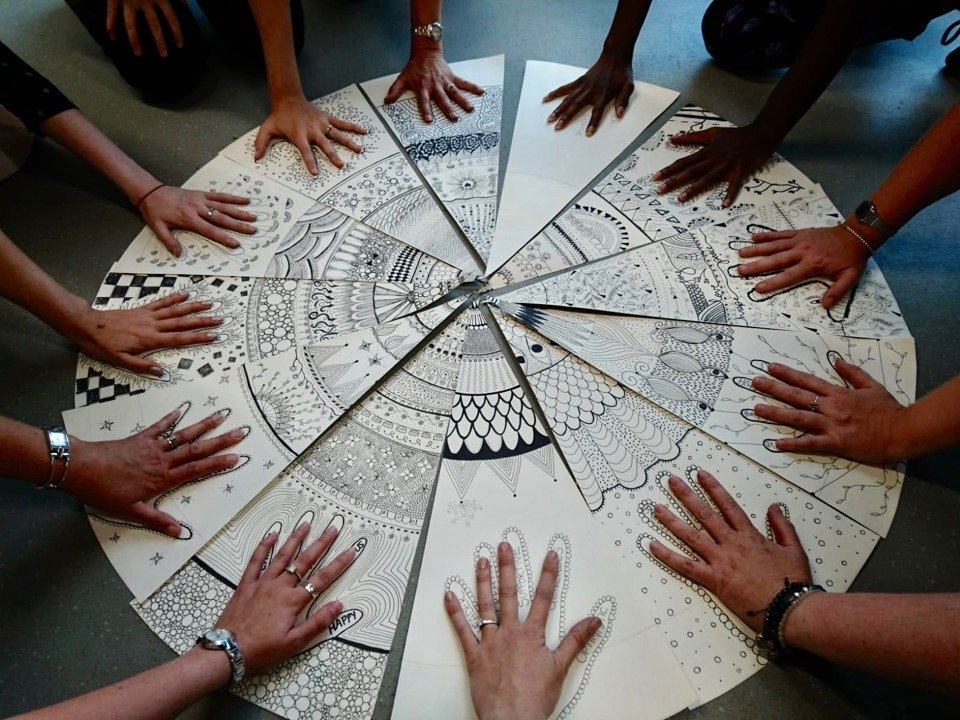
One Cloak
One cloak Living & loving aligned with sustainable Socio-economic & Ecological Stewardship The symbol of ‘One Cloak’ constitutes a tapestry of tenets that combine to

In an era characterized by consumerism, excess, waste, and exploitation of people, animals, and the planet, the idea of LIVING SIMPLY has gained significant traction within vegan and animal right-to-life and liberty activist communities. Likewise, environmentalists promote, encourage, and often facilitate eco-social living—an approach that is increasingly accepted and practiced by broad segments of the global population.
For communitarians preparing to enter ‘COMMUNAL UNION’, the first step involves embracing living simply through deciding which possessions we need to keep for our exclusive personal use, those that could and should be put into the common pot to be shared, and those things that need to be discarded, recycled, up-cycled, or repurposed.
Minimizing the amount of personal possessions stored within our living spaces is an essential component of making a successful transition to communal living and loving. The primary aim of decluttering and organizing our living spaces, along with consciously improving our daily habits of cleanliness and orderliness, is to overcome the negative traits of sloth, vanity, and excess that prevent us from living in harmony with those who love and support us through ‘DEEP UNION’.
In the fifth year of association and beyond, communitarians are called to focus on what truly matters—relationships—creating and maintaining strong bonds with those who share our vision, mission, and ‘RICH BY ASSOCIATION’ common wealth endeavours.
Furthermore, by adopting the practice of prioritizing quality over quantity, minimalism offers communitarians a myriad of benefits, which includes enhanced personal well-being and social integration as well as significant economic advantages, while also contributing to responsible stewardship of land, air, and sea.
One of the most immediate benefits of embracing a simple living lifestyle is the reduction of mental clutter. Our possessions and environment can overwhelm us mentally if we fail to consistently allocate time to clean and organize our food stores, kitchen facilities, clothing and footwear, linens, and other belongings.
For this reason, communitarians who follow the ‘ONE CLOAK’ principle make it a priority to declutter regularly. This helps them stay focused on daily tasks, supports personal development, and ensures they have the mental clarity, time, and calm needed to contribute their best to collaborative projects.
Communitarians are encouraged to integrate decluttering, cleaning, and organizing into their daily routine. This practice not only keeps our everyday living spaces and workplaces healthy, hygienic, and visually pleasing. Adopting these habits also ensures we are always ready to extend hospitality to others at any time.
Research consistently shows that a tidy, organized environment boosts concentration and promotes a calmer state of mind.
Cognitive Load Theory: Clutter bombards the brain with excessive stimuli, leading to cognitive overload. By decluttering, we reduce distractions, allowing for sharper focus and mental clarity. A Princeton study confirmed that clutter competes for attention, reducing performance and raising stress levels. (NeuroscienceLab)
Psychological Impact of Clean Spaces: Research from the Personality and Social Psychology Bulletin found that people with cluttered homes reported higher stress and fatigue. In contrast, those with organized spaces felt more relaxed and at ease (Princeton Neuroscience Institute).
Mindfulness and Control: A study in the Journal of Environmental Psychology reveals that organized environments foster a sense of control, reducing anxiety and enhancing focus and well-being.
Minimalism and Mental Health: Studies on minimalism highlight that decluttering leads to mental health benefits, such as improved concentration, reduced anxiety, and greater peace of mind.
Living Simply encourages communitarians to streamline their possessions and also to reduce the time, energy, and resources spent on frivolous pursuits that have no lasting value. Following the principle and practice of ONE CLOAK, communitarians are mindful to make the best of their days by not engaging in activities that go against the principles of ‘Living with Less to Share More’.
For these reasons, those aligned with the consumption principle of “LIVING SIMPLY” refrain from:
Following Fashion Trends: Constantly chasing new clothing trends leads to an accumulation of items that may be worn briefly but then discarded. In contrast, ethical consumption underpinned by the principles and practices of eco-social living, encourages those adopting the lifestyle of conscious clean-green sustainable consumption to have fewer clothes that are well-coordinated, timeless, and durable pieces that reduce decision fatigue while also reducing the need to cast off clothing that goes out of style or does not wear well.
Collecting Unnecessary Gadgets: Buying the latest tech gadgets, when they are not actually needed, adds clutter to both our living spaces and mental load. Instead, ethical consumption favors functionality over abundance, purchasing only the things that serve a practical purpose.
Impulse Buying: Regularly purchasing items on a whim, whether that be clothes, décor, or electronics, conflicts with ONE CLOCK principles. Conversely, ethical consumption promotes intentional buying that sees us mindfully only acquiring and keeping things that add true value to our lives and the lives of our extended commonly-bonded associates, as well as benefiting the wider world of animals and planet.
Hoarding Sentimental Items: While it is perfectly natural to want to keep items that hold emotional significance, holding onto too many of these nostalgic keepsakes creates clutter. Those moving toward communal living and loving are encouraged to carefully select a few sentimental items, focusing on quality over quantity, and pieces that may also be appreciated by those who share our living facilities.
Subscription Services: Signing up for multiple entertainment or product subscriptions (e.g., streaming platforms, monthly boxes) can lead to financial and mental clutter. Minimalism advocates for curating a few meaningful experiences instead.
“CLEANING UP OUR ACT,” so to speak, reduces the chaos of clutter while also strengthening the ONE CLOAK goal of leading a simpler, more focused life.
When communitarians commit to owning fewer things by practicing minimalism and also pooling resources with those who share the communitarian lifestyle and love-style of COLLABORATIVE COMMON PURSE PROVISIONING, the pay-offs will include spending less time managing, maintaining, and organizing ‘stuff’. Similarly, by prioritizing meaningful activities over numerous trivial engagements, those living by the tenets of ‘ONE CLOAK’ can direct their time and energy toward pursuits that provide genuine stimulation and lasting fulfillment.
As the majority who practice Eco-social living will attest, living simply provides substantial economic benefits. By focusing on what is truly necessary and avoiding impulse purchases and compulsions to hoard, together with pooling resources that do not need to be kept for our exclusive use, those who are committed to applying the principles of conservation, recycling and restoring, along with MAKING and repairing clothing and household items, will inevitably save money while also reducing debt.
Instead of indiscriminately spending money on ‘fast fashion’ or continually replacing poor quality furniture and fittings, making over our consumer habits is sure to reward those adopting responsible stewardship of the earth’s resources with the financial freedom to pursue personal passions that include travel, investing in education and personal development.
Transitioning to eco-social living naturally requires time, patience, and practice to master the skills of prudent, intentional spending, while also strengthening our capacity to plan and save to achieve long-term goals by breaking free from the culturally conditioning of consumerism.
With fewer distractions and a clearer sense of priorities, Eco-social Living can positively impact relationships with those who walk beside us on the path to establishing harmonious shared living and collaborative economic security through ‘common’ wealth provisioning projects. By reducing the clutter and stress associated with managing excess possessions, communitarians associates across the globe can devote more time and attention to meaningful interactions with those who live and love the associative lifestyle. Furthermore, ethical consumption coupled to sharing resources fosters a mindset of gratitude and appreciation for people rather than ‘things’, which is sure to strengthen bonds and improve communication within relationships.

One cloak Living & loving aligned with sustainable Socio-economic & Ecological Stewardship The symbol of ‘One Cloak’ constitutes a tapestry of tenets that combine to

Transitioning To ‘Rich by Association’ SHARED PROSPERITY aligning with the principles & practices of ‘ONE CLOAK’ to achieve ethically sustainable economic security via communal union

Transitioning To LIVING SIMPLY preparing for deep union sustainable living & loving In today’s world of hyper-consumerism and individualism, transitioning to a simpler way of

Preparing To Share | building a bridge to ‘deep union’ | A guide to Living with less & Sharing more | | Know Thyself |

Breaking Free of Consumer Cultural Conditioning | reimagining sustainable living through ‘common purse’ collaborative provisioning | Before making any practical changes, a critical step toward

downsizing & decluttering – preparing for shared Prosperity Making Space for Collective Abundance through Collaborative Living As communitarians continue the journey toward LIVING SIMPLY, Step
Financial Foundations of Merging into Collaborative Union | navigating the journey from individual economic provision to the “Rich by Association” Share Economy | Transitioning to